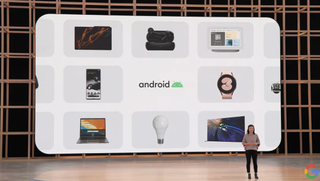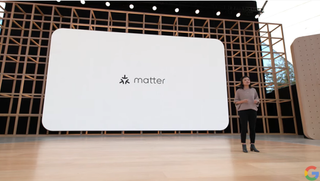Google goes all-in on Matter in bid to save the smart home
One smart home protocol to rule them all

A neat and new-ish service from Google called Fast Pair is designed to speed up the process of connecting smart home devices to your phone and to each other. It uses Bluetooth Low Energy (BLE) to discover nearby devices without using significant phone battery.
In theory everything just pops up on your screen – if it supports the right protocol, of course. Historically, that’s been the hold-up with smart home connectivity, and Google says Matter will solve the problem – when it arrives, that is.
At Google I/O 2022, the company touted the “magical” power of Fast Pair and the Matter connectivity standard to link devices and services from a wide array of manufacturers, solving one of the key issues that anyone who’s tried to set up a smart lightbulb or smart hub will be familiar with.
Matter is an incoming new connectivity standard that's supported by Samsung, Google, Amazon, Apple, and others that promises vastly simpler setup, much greater interoperability, faster speeds, and more.
Last year at Google I/O, the company said it planned to roll out Matter support – previously called Project Connected Home over IP (CHIP) – to its Nest thermostats, speakers and displays first, following which it would become a part of Android as well.
One year later, we’re still waiting. Despite the brief mention during the I/O event, the standard still isn’t here. Matter was delayed to the start of 2022, and has been delayed again to this autumn (so September-November), the Connectivity Standards Alliance (CSA) which is overseeing the rollout, told The Verge earlier this year.
Google also pledges that Matter will be the foundation of the proactive home, something I’ve been waiting on for years. When Google announced its entry into home security, this was a key distinguishing feature: rather than passively flagging an open door or window, the Google Assistant would actively prompt you to shut it. Or remind you that you usually turn off the downstairs lights before heading upstairs.
Sure, it’s a bit nosy. I don’t need a reminder that Google knows which room I’m in within my own house. But I do need to remember to turn off the outside lights.
Get daily insight, inspiration and deals in your inbox
Get the hottest deals available in your inbox plus news, reviews, opinion, analysis and more from the TechRadar team.
And while Google did mention Matter, it was very light on features and substance. No mention was made of “the proactive home,” and beside a quick demo with an Eve smart plug – a device that really only uses Apple’s HomeKit – there wasn't much 'there' there.

So what is Matter, exactly?
Any smart home device that adheres to the protocol, which currently covers Ethernet, Wi-Fi, Bluetooth and Thread smart home technology to connect to the internet, will be easier to set up too. Devices that support Matter can be added to a smart home by using a simple code, rather than requiring several steps that differ depending upon the manufacturer of the device.
Laggy smart home automations are certainly one of the biggest challenges when it comes to smart homes, and with Fast Pair and smarter, seamless technology, Matter claims it will make smart home devices work seamlessly together faster.
Apple, Amazon, Google and SmartThings are just some of the 180 brands supporting Matter – an IP-based connectivity protocol that was initially launched in 2019 under the moniker Project Connected Home over IP (CHIP), and is designed to standardize how smart home devices communicate and work together.
If Matter can do what Google says, it’ll be great. We look forward to trying it out –
whenever it ultimately launches.

After 25 years covering the technology industry, Jeremy Kaplan is a familiar face in the media world. As Content Director for TechRadar, he oversees product development and quality. He was formerly Editor in Chief of Digital Trends, where he transformed a niche publisher into one of the fastest growing properties in digital media. Before that, he spent half a decade at one of the largest news agencies in the world, and cut his teeth in magazine business, long before the birth of the iPhone. In 2019, he was named to the FOLIO: 100, which honors publishing professionals making an industry-wide impact.
